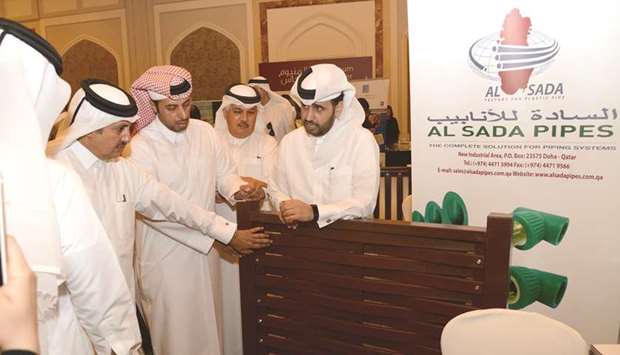National products managed to fiercely compete with other products from around the world in the Qatari market at a time when the country is working to achieve self-sufficiency in term of imported foodstuffs.
Although the national product has been in the local market for years, the siege imposed on Qatar has once again highlighted the importance of these products after the closure of Qatar’s only land port with Saudi Arabia as well as the encroachments of the siege countries on international sea and air corridors.
Since the beginning of the siege of Qatar on June 5, national products have emerged as a strong alternative to other products, thus increasing the production capacity of materials manufactured in Qatar to meet the needs of the market.
In the early days of the crisis, the Ministry of Economy and Commerce launched an initiative to support national products in co-operation with major shopping malls by co-ordinating with them to display the national products clearly and placing a national product logo on local goods and products.
Citizens and residents in Qatar welcomed the call and launched campaigns on social media to support national products under the theme “Together to Support National Products”.
The ministry called on all restaurants and cafeterias in Qatar to use national products in order to support these products.
As part of Qatar’s keen interest in supporting and encouraging local production of all national products, HE the Minister of Municipality and Environment Mohamed bin Abdullah al-Rumaihi in previous statement said the upcoming period will see the opening of two agricultural production complexes for livestock, poultry, fish and feed production with the support of Qatar Development Bank.
The minister said that based on the directives of His Highness the Emir Sheikh Tamim bin Hamad al-Thani, the ministry is supporting farmers and organising such production festivals, which will continue to distinguish them from year to year in terms of quantity and quality of production.
In a statement to Qatar News Agency (QNA), HE the Assistant Undersecretary for Agriculture and Fisheries Affairs at the Ministry of Municipality and Environment, Sheikh Dr Faleh bin Nasser al-Thani, pointed to the livestock production projects that will be implemented during the coming period, saying that these new projects in Qatar include Baladna livestock farm which targets 40% share in dairy products’ market in the country.
He pointed also to Ghadeer, Maha and Dandy dairy companies’ expansion to increase production, according to a plan that is likely to make the country self-sufficient after six months.
In the red meat sector, he said that the State of Qatar is witnessing an increase in the number of animals up to about 20% annually, while working on the development of breeding and increasing the number of animals, noting that the total number of these animals in the country reaches 1.35mn, 70% of them are sheep.
In the field of poultry production, the Arab poultry company is expanding its poultry production by 100% to about 20mn chickens a year instead of the current 10mn chickens a year.
He noted that with this increasing pace of production, is expected to make the country 100% self-sufficient of fresh poultry in less than a year.
He pointed out in a related context to some strategic projects launched by the private sector recently, including a project to produce 40mn chickens annually.
For egg production, Sheikh Dr Faleh bin Nasser al-Thani told QNA that as part of the efforts to expand the Arab Qatari Company to increase its poultry production by 100%, and thus increased the production of eggs from 60mn eggs to 100mn eggs per year, bringing the production after the completion of expansion within the next six months to about 120mn eggs per year.
He touched on the State’s efforts to develop Qatari farms, including the prolongation of the agricultural season for nine months a year, contributing to the plan to achieve 65% self-sufficiency in vegetables within two years.
On the other hand, Qatar has achieved self-sufficiency in the fishery sector, which has now reached 89%. It is pursuing a short-term plan to increase this to 100% in a year.
The State has three fish farming projects and their combined production is about 6,000 tonnes per year.
There is also a shrimp fish project, with a production of 1,000 tonnes of fish per year, which is enough for the country to export abroad.
For its part, Qatar Development Bank (QDB) has focused on accelerating growth and encouraging national projects within private sector activities in key economic areas that will generate various economic and social benefits for Qatar’s economy in line with Qatar National Vision 2030.
QDB seeks to support local entrepreneurs in the private sector, diversify the economy and help Qatari manufacturers to expand their industry.
The bank also aims to promote entrepreneurship in the private sector and provide services in the economic fields through the provision of capital, guarantees and advisory services.
The QDB organised a forum titled ‘Buy Local Products’ on July 11, which brought together 70 Qatari companies from five key sectors along with 250 local buyers to encourage small and medium enterprises to expand their local business in sectors such as steel and iron, plastics, wood, aluminium and copper, and general building materials.
Following the success of the first edition of “Buy Local Products,” QDB organised the second edition of the “Buy Local Products” exhibition on July 25, with the participation of more than 150 companies as well as an even wider range of products on showcase than the first edition and it was an opportunity to showcase their products and complement the nation’s renewed objective to localise the country’s supply chain and increase self-reliance.
On the sidelines of the forum, a memorandum of understanding (MoU) was signed between QDB and Public Works Authority (Ashghal) to launch the ‘Ta’heel’ initiative for SME.
The new approach gives the factories an opportunity to participate in the implementation of Ashghal’s programmes and projects, through enlistment of Qatari manufacturers in the authority’s approved supply chain, in addition to accrediting local industrial products that meet the technical requirements, specifications, and the standard quality levels.
Earlier this year, QDB’s Al Dhameen service proved critically important in the service of entrepreneurs because these indirect loan facilities are viable by both existing companies as well as completely new startups.
The purpose of these initiatives is to strengthen the non-oil and gas product manufacturers in the private sector.
Through its Tasdeer export programme, QDB aims to strengthen the presence of Qatari companies on prestigious global platforms, linking Qatari specialists to international experts across the world’s production industries.
The bank also provides business development consulting services to help entrepreneurs prepare their own feasibility studies, conduct market research, select appropriate technology and build entrepreneurial capacities to enhance their youthful skills and establish linkages with financial and non-financial support agencies.
QDB Chief Executive Officer Abdulaziz bin Nasser al-Khalifa told QNA that “the role of QDB is to support Qatari entrepreneurs and SME entrepreneurs by opening new horizons for them”.
He explained that the support of Qatari entrepreneurs includes providing consultancy services and training courses, as well as direct financing through Ithmaar or indirectly through the ‘Al Dhameen’ service, as well as opening markets to them by participating in an export programme to develop and promote their products internationally.
The QDB chief said the bank is supporting the small and medium enterprises (SMEs) and their products, including chemicals, wood, plastics, electronics as well as food and beverage.
In order to support the local market demand from fresh produce, Hassad Food, Qatar’s premier investor in food and agri-business sectors, announced the launch of its newest initiative Iktefa’, which targets unproductive local farms, which represents more than 80% of registered local farms, to encourage their production through purchasing farmer’s yearly production from fresh vegetables and fruits, following clear commercial terms, then sell them in the local market.
This move comes with the aim of increasing the role of the local farms, and efficiently utilising its commercial operations, in order to support the local market demand from fresh produce.
“It’s our pleasure to be launching Iktefa’ initiative, we hope that through this important initiative will build bridges of co-operation with local farmers,” Hassad Food CEO Mohamed al-Sadah.
In a statement to QNA, Hassad Food’s CEO noted that this launch is a continuation of the company’s constant efforts to support the local market demand, by supplying a number of strategic products on a daily basis via air freight and sea route to Qatar.
The range of high quality products provided by Hassad includes dairy products, table eggs, poultry, fresh vegetables and fruits, from more than 10 countries including Turkey, Kuwait, Azerbaijan, Oman and Lebanon.
“Hassad Food will provide all needed support and services to the participating local farm owners in order to produce high quality products to the local market.
“We co-ordinated with a number of corporations in friendly countries to provide the local market with a steady supply of high quality strategic products, in a cost effective manner.
“Our first shipment arrived to Qatar on June 6, and since then we are supplying the market with daily shipments that are in line with the market need.
“Through our partnership with Widam Food, Hassad Australia will provide the local market with more than 340,000 head of Australian sheep (chilled carcasses) over the course of three months, started in June,” al-Sadah added.
As part of this initiative, Hassad will provide several services for the participating local farms including support in developing feasibility studies for the farms seeking financial support from concerned entities to build green houses, supply of agricultural inputs (delayed payment for a period not more than 90 days,) technical supervision for the farms, purchase of the farms yearly production from fresh produce under clear commercial terms agreed by both parties in addition to logistical support and other services.
Moreover, the company announced that the targeted capacity for the first phase is around 60 hectares, which produces yearly around 5,000 tonnes of fresh produce, this figure will increase gradually over the next phases.
Hassad also announced that an internal committee has been formed to review and assess all submitted participation requests, and then select the local farms that comply with the needed specifications.

QDB CEO Abdulaziz bin Nasser al-Khalifa and Qatar Chamber chairman HE Sheikh Khalifa bin Jassim al-Thani inspect some of the products on display at the ‘Buy Local Products’ event organised by QDB recently. PICTURE: Thajudheen


